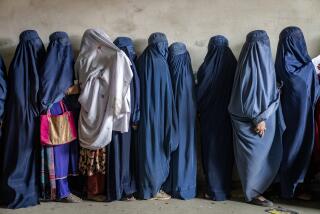Fighting for Their Future
BAGHDAD — When U.S. troops entered Baghdad, members of the Iraqi Women’s League, a pro-democracy group suppressed under Saddam Hussein, cheered.
But these days when members gather in their shabby office, the talk is of an unexpected consequence of the dictator’s overthrow: a decision by the U.S.-backed Iraqi Governing Council to replace the country’s civic family laws with Islamic Sharia.
“We had a war with a tyrant regime, but now we have another kind of war,” said Aida Ayeedi, a teacher at the College of Agriculture in Baghdad. “This war is with those religious men who think that women are just instruments to bear children and create the next generation.”
Pushed through with little discussion, primarily by the Shiite Muslim members of the council, the measure would shift women’s fates from the hands of judges to those of clerics, most likely chosen by their husbands, who may have little commitment to protecting their rights. For many women, that would roll back what they had under Hussein, who granted them a measure of personal if not political freedom -- albeit one spiked by a constant fear for their families.
Technically, the measure cannot go into effect until it is signed by the U.S. civilian administrator for Iraq, and it is unlikely that L. Paul Bremer III, a strong proponent of involving women in governance, would do so. But as soon as the U.S. hands over power to Iraqis this summer, it could be enacted.
“We can’t ever let this law be passed,” said Maysun Damluji, an architect who is serving as deputy culture minister and is organizing a grass-roots movement to block it.
The measure’s passage highlights the danger that Iraqi sovereignty will fail to yield the pluralistic democracy with protection for individual rights that President Bush has set as his goal. The peremptory manner in which Sharia was approved also suggests that at least for the moment, it will be difficult for underrepresented groups such as women to wield political influence in Iraq.
Iraqi women are perhaps the most diverse in the Arab world. In an hour’s walk through the busy Karada shopping neighborhood in Baghdad, one can encounter highly Westernized professionals who eschew head scarves known as hijab, wear pantsuits and look people squarely in the eye. But there are also women covered by the full black robes known as abayas, wearing tight black scarves that reveal not a strand of hair. And there are those in between, who wear loose, shapeless clothing in neutral or pastel shades, their heads covered casually with hijab, their hair visible.
Of course, clothes do not make the woman. There are professionals who wear abayas and homemakers -- both religious and secular -- who wear Western clothes. But in general those who most fear the new move toward Sharia are those who are most educated. Although in Iraq -- as in the rest of the Arab world -- the community generally holds the paternalistic view that women need the protection of male family members, women have enjoyed some measure of progress.
“Iraq has had women doctors for decades, for example.... This will make things very difficult,” said Damluji, whose aunt and mother were two of the nation’s first doctors. “That’s why we must work very hard to change it.”
The law under Hussein was a progressive amalgam of the most generous Sharia rules toward women -- drawn from each sect -- on marriage, divorce, custody of children and inheritance, according to lawyers and judges. Although women were never treated better than their male counterparts, under Iraq’s civil law at least a judge rather than a cleric heard their cases in matters of divorce and child custody, ensuring a measure of equity regardless of the woman’s sect or ethnic background.
Lawyers and judges who have read the measure say there would be no need for their services anymore.
“This operation needs a cleric, not a judge,” said Latif Khalil Hamdani, a judge in the Mansour neighborhood family court. “They don’t need us.”
If the new system goes into effect, couples of different sects will get different answers to the same questions.
“It would be variable, it’s going to create problems,” Hamdani said. “Every cleric is going to base his opinion on his reading of Sharia. It will be his personal view.”
But in a reflection of the societal reticence surrounding any comment that could be interpreted as a lack of faith in the wisdom of the Koran, every judge and lawyer interviewed insisted that Sharia law was superior to civil law. One senior judge took out a booklet on the civil law and read aloud from it to demonstrate how much of it had been culled from Islamic religious texts.
“Sharia is from God, the law is man-made, and Sharia is better because what comes from Allah is fixed,” said Kadhim Jubori, 55, who has practiced family law for 33 years in Baghdad.
A similar attitude was evident in the comments of Governing Council members who supported the measure. Ibrahim Jafari, a member from the Shiite Dawa Party, said Islamic law was more progressive than U.S. law, noting that in Islam women have had the right to vote for 1,400 years but only received that right in the United States in 1920.
While cautioning against interpreting individual Koranic verses too literally, he said, “Islam makes a woman the responsibility of her father until she marries, and then she is the responsibility of her husband.”
He also noted that the Koran says “a man is worth two women” but added, “We have to be careful about taking verses in isolation.”
A further obstacle faced by women opposed to the measure became apparent at last week’s Friday prayers at some Shiite mosques, during which clerics urged women to turn out for a demonstration today in favor of the Sharia measure.
In a country where Shiites make up the majority but were suppressed under Hussein, Shiite clerics wield tremendous power. It is often said that under Hussein there were two political forces in Iraq, his Baath Party and the mosques. Now that the Baath Party is gone, the mosques’ power has become even more pronounced.
Secular women have no comparable forum through which to reach large numbers of women. At one Baghdad court, several female lawyers stared blankly when asked about the new Sharia measure.
According to feminist activists and some lawyers, Shiite Sharia treats women better than the Sunni law. For instance, under Shiite Sharia, a man faces a divorce procedure before a cleric, but under Sunni Sharia, a man can get divorced if he says, “I divorce you, I divorce you, I divorce you.”
Inheritance rules for women are similarly more advantageous under Shiite law, the activists say. Under Sunni law, the inheritance is always divided with male relatives, even distant ones, whereas under most Shiite laws, a woman is obligated to share an inheritance only with her brothers.
Sharia law also allows a man to have more than one wife, a practice that educated women view dimly. Polygamy is permitted under Iraqi civil law, but it is uncommon in larger urban areas. “It is one of our organization’s goals that a man should marry only once,” said Suhad Naji, 33, a member of the Iraqi Women’s League.
Naji said that although there were women in politics now, they occupied only a handful of positions, and some had been intimidated when they tried to run for local office.
“One member of our league, who was trying to run for local office, some people came and opened fire on her house a month ago,” she said.
Despite their worries, the women talked openly about their views and said for all their fears, their sense of freedom was greater now than under Hussein. They searched for a way to explain the combination of a sense of incipient threat but overall newfound freedom.
“Now I am afraid only for myself,” Naji said, “but under Saddam I was afraid for my whole family.”
Maha Sadban, a firm but soft-spoken pediatrician in the south-central Iraqi town of Diwaniyah, said she was unperturbed by successful efforts to keep her from winning a seat on the local council.
“Many ladies came to me and said they didn’t know that ladies can be nominated for the council and they didn’t know that any women could vote because there was no proper media coverage,” she said. “It will change, but gradually.”
More to Read
Sign up for Essential California
The most important California stories and recommendations in your inbox every morning.
You may occasionally receive promotional content from the Los Angeles Times.










